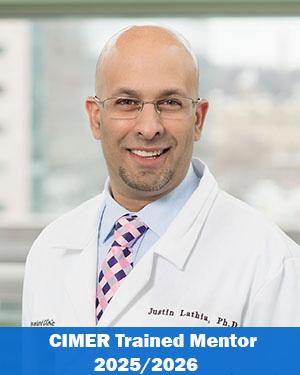Research News
12/16/2024
Common metabolite spermidine drives glioblastoma tumor progression by interfering with T cells
The findings could aid in the development of more effective glioblastoma treatment.

High levels of the metabolite spermidine could interfere with T cells and contribute to the microenvironment of glioblastoma, according to Cleveland Clinic research published in The Journal of Clinical Investigation.
Spermidine was found to be detrimental to the survival and function of T cells, white blood cells that play an essential role in the immune system and help fight harmful cells like cancer. This research provides more evidence as to why immunotherapy is so ineffective on glioblastoma, as T cells are harnessed in the development of immunotherapies for cancer treatment.
“Ideally, the findings from this study will lead to additional targets in the immune microenvironment from a metabolic angle,” says Kristen Kay, PhD, first author of the study. “Combining medications that can stop the synthesis as well as the transport of spermidine amongst cells in the microenvironment could potentially lessen some of the suppression of present immune cells, allowing for a more active immune response to combination therapies that include immunotherapy.”
What are the barriers to glioblastoma treatment?
Glioblastoma (GBM) is the most common type of malignant brain tumor that starts in the brain in adults. Cancer cells in glioblastoma tumors rapidly grow and multiply and can spread throughout the brain. Glioblastoma is also one of the most difficult cancers to treat. Current glioblastoma treatment consists of surgery to remove the tumor, typically followed by radiation and chemotherapy.
Many promising treatments that have been developed for other solid tumors have not been successful when used with glioblastoma patients. The 5-year survival rate amongst glioblastoma patients remains dismally low.
Dr. Kay is a recent graduate of the Cleveland Clinic Lerner College of Medicine’s Molecular Medicine PhD program and worked in the lab of Justin Lathia, PhD, which studies contributors to glioblastoma.
Glioblastoma has remained difficult to treat due to the potent immune suppression in the microenvironment, Dr. Lathia explains, where tumors develop strategies to target the immune cells that have evolved to fight the cancer.
“Any new piece of information we can find to add to our understanding about this devastating disease is another contribution to the field that could potentially work into future combination therapies,” Dr. Kay says. “My focus is contributing to an increase in that number over my lifetime. Giving these patients additional months onto their short life prognoses could make a huge impact on them and their families.”
What is spermidine?
Spermidine is a metabolite made by our cells that promotes cell growth and proliferation through their role in DNA replication and translation. At normal levels, spermidine is essential to keeping a healthy internal environment for our cells and is associated with neuroprotection. However, elevated levels of spermidine have been connected to cognitive impairment and diseases like Alzheimer’s disease.
Dr. Kay says the impetus for this study came from earlier projects in conjunction with the labs of Stanley Hazen, MD, PhD and Mark Brown, PhD which found that spermidine influenced multiple immune cell populations present in the glioblastoma tumor microenvironment. Many cancer researchers are interested in the back-and-forth between healthy and cancer cells and how it affects cellular metabolism, Dr. Lathia explains.
Following this data, Dr. Kay found that tumor cells were producing spermidine, contributing to elevated levels in the cell environment around the tumor. This affected cell stability and function, including for the T cells fighting the tumor.
“Dr. Kay’s work provides a good example of the type of research that is possible in our Molecular Medicine PhD program,” Dr. Lathia says. “She was able to make key observations in the lab, test them in pre-clinical models and validate them in human samples. This approach is at the cutting-edge of translational research.”
Could these findings lead to improved glioblastoma treatment?
As part of its translational approach, the Lathia lab regularly collaborates with neurosurgeons and neuro-oncologists. Neurosurgeons Josie Volovetz, MD, and Matt Grabowski, MD, provided insight into the patient samples examined in this study and provided feedback for translating the findings into patient care.
This direct link between a tumor producing a metabolite and the immune system lays a foundation for potential combination therapies.
Future research includes examining other potential sources of elevated spermidine, including other cells in the tumor microenvironment and sources of spermidine in our diets.
“When I joined the Lathia laboratory, I was determined to explore a new path of research. I’m so grateful that my mentor, Dr. Lathia, was fully on board to guide me,” Dr. Kay says. “I’ve already gained so much resilience and learned the value of ‘failed’ experiments. In the moment, it can be very disheartening, but they serve a purpose — to eliminate other possibilities and narrow the path to the eventual answer.”
Featured Experts
News Category
Related News
Research areas
Want To Support Ground-Breaking Research at Cleveland Clinic?
Discover how you can help Cleveland Clinic save lives and continue to lead the transformation of healthcare.
Give to Cleveland Clinic